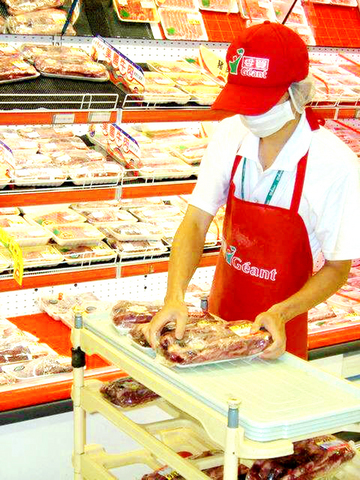Amid pressure from the Consumers' Foundation and some legislators that the government destroy US beef imported to Taiwan, the Department of Health (DOH) reiterated yesterday afternoon that beef already on store shelves in Taiwan is safe and does not need to be removed.
"Although we reinstated a ban on US beef after the confirmation of a second mad-cow case, the meat currently on the shelves is safe and there is no need to recall the beef," DOH Bureau of Food Safety director Chen Lu-hung (陳陸宏) said yesterday.
He was responding to criticism that the DOH is ignoring public health over the US beef issue.

PHOTO: YANG YA-MIN, TAIPEI TIMES
The DOH's announcement came after reassurances from the American Institute in Taiwan (AIT) that US beef does not pose a threat to public health.
"We hope Taiwan will move swiftly to re-open the beef market after the AIT shares detailed information on the recent [bovine spongiform encephalopathy] BSE detection," AIT Director Douglas Paal said yesterday morning during a press conference at the American Cultural Center.
"I would also like to take this opportunity to guarantee to Taiwan customers that the US beef you have been eating and enjoying in great numbers has been, and continues to be, safe," he added.
The AIT held a press conference yesterday to dispel public fears about the safety of US beef.
According to Paal, who appeared at the Taipei Food Show earlier this month to promote US beef, the second confirmed case of mad-cow disease was discovered through a re-examination of an old sample from last year. The test result of this sample was not connected to the beef imported to Taiwan and therefore there is no threat to public health.
Lawmakers yesterday grilled the DOH for "fawning" on the US by insisting on keeping its beef on the market despite the so-called "mad cow threat."
"The DOH's decision to lift the ban on imports of US beef in mid-April and its refusal to recall the meat at stores now is based on political considerations," said Chinese Nationalist Party (KMT) Legislator Joanna Lei (雷倩). "We demand the department end its `beef diplomacy' and stop trading people's lives for diplomatic space."
Responding to the accusations from opposition legislators and the Consumers' Foundation, the DOH yesterday reiterated that the beef was safe and its continued presence on the shelves had nothing to do with political considerations.
After a second case of BSE, or mad-cow disease, was confirmed in the US, the DOH reimposed a ban on US beef imports on Saturday.
The reinstatement of the ban generated concerns from consumer groups that the government should not have lifted the ban on US beef imports in April. They pointed to Japan and South Korea, which did not lift their respective bans on US beef.
Taiwan is the sixth-largest market for US beef, and US$325 million in beef was sold in 2003. Japan is the No.1 market, and was worth NT$1.4 billion in the same year. The first case of the disease in the US was confirmed on Dec. 24, 2003. Taiwan banned US beef imports a week later.
Also see story:

Chinese spouse and influencer Guan Guan’s (關關) residency permit has been revoked for repeatedly posting pro-China videos that threaten national security, the National Immigration Agency confirmed today. Guan Guan has said many controversial statements in her videos posted to Douyin (抖音), including “the red flag will soon be painted all over Taiwan” and “Taiwan is an inseparable part of China,” and expressing hope for expedited reunification. The agency last year received multiple reports alleging that Guan Guan had advocated for armed reunification. After verifying the reports, the agency last month issued a notice requiring her to appear and explain her actions. Guan

GIVE AND TAKE: Blood demand continues to rise each year, while fewer young donors are available due to the nation’s falling birthrate, a doctor said Blood donors can redeem points earned from donations to obtain limited edition Formosan black bear travel mugs, the Kaohsiung Blood Center said yesterday, as it announced a goal of stocking 20,000 units of blood prior to the Lunar New Year. The last month of the lunar year is National Blood Donation Month, when local centers seek to stockpile blood for use during the Lunar New Year holiday. The blood demand in southern Taiwan — including Tainan and Kaohsiung, as well as Chiayi, Pingtung, Penghu and Taitung counties — is about 2,000 units per day, the center said. The donation campaign aims to boost

The Kaohsiung Tourism Bureau audited six hotels in an effort to prevent price gouging ahead of Korean band BTS’ concert tour in the city scheduled for Nov. 19, 21 and 22 this year. The bureau on Friday said that the audits — conducted in response to allegations of unfair pricing posted on social media — found no wrongdoing. These establishments included the local branches of Chateau de Chine, Hotel Nikko, My Humble House, and Grand Hai Lai, it said, adding that the Consumer Protection Commission would have penalized price gougers had the accusations been substantiated. The bureau said the Tourism Development Act

The Central Weather Administration (CWA) said a magnitude 4.9 earthquake that struck off the coast of eastern Taiwan yesterday was an independent event and part of a stress-adjustment process. The earthquake occurred at 4:47pm, with its epicenter at sea about 45.4km south of Yilan County Hall at a depth of 5.9km, the CWA said. The quake's intensity, which gauges the actual effects of a temblor, was highest in several townships in Yilan and neighboring Hualien County, where it measured 4 on Taiwan's seven-tier intensity scale, the CWA said. Lin Po-yu (林柏佑), a division chief at the CWA's Seismological Center, told a news conference